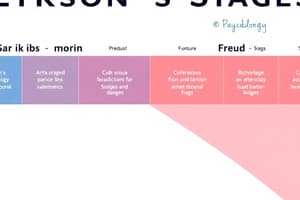Podcast
Questions and Answers
A child is having difficulty learning to ride a bicycle. According to Vygotsky's theory, what strategy would be most effective in helping them learn?
A child is having difficulty learning to ride a bicycle. According to Vygotsky's theory, what strategy would be most effective in helping them learn?
- Breaking down the task into smaller, manageable steps and providing support as the child masters each step. (correct)
- Showing the child videos of professional cyclists and expecting them to imitate the techniques.
- Ignoring the child's attempts and focusing on the achievements of other children learning to ride.
- Allowing the child to struggle until they figure it out on their own to foster independence.
Which of the following research designs is most suitable for examining how personality traits developed in childhood impact an individual's career choices in adulthood?
Which of the following research designs is most suitable for examining how personality traits developed in childhood impact an individual's career choices in adulthood?
- A naturalistic observation of children playing and making career-related statements.
- A longitudinal study that follows the same individuals from childhood to adulthood. (correct)
- A case study that focuses on the detailed experiences of a few individuals.
- A cross-sectional study that compares personality traits and career choices of different age groups.
A researcher is investigating the relationship between hours of sleep and test performance in adolescents. If they find a correlation coefficient of +0.75, what is the most accurate interpretation?
A researcher is investigating the relationship between hours of sleep and test performance in adolescents. If they find a correlation coefficient of +0.75, what is the most accurate interpretation?
- There is a strong positive correlation between hours of sleep and test performance. (correct)
- Increased test performance causes more hours of sleep.
- There is a strong negative correlation between hours of sleep and test performance.
- Lack of sleep causes poor test performance.
A school implements a new policy where students who consistently exhibit good behavior are rewarded with extra recess time. According to operant conditioning principles, what type of consequence is this?
A school implements a new policy where students who consistently exhibit good behavior are rewarded with extra recess time. According to operant conditioning principles, what type of consequence is this?
According to Bronfenbrenner's ecological systems theory, which level encompasses the interactions between a child's family and their school?
According to Bronfenbrenner's ecological systems theory, which level encompasses the interactions between a child's family and their school?
Flashcards
Development
Development
Changes (growth) and continuities from conception to death.
Nature vs. Nurture
Nature vs. Nurture
Inborn biological givens (genes) vs. physical and social environment (how you were raised).
Plasticity
Plasticity
Capacity to change, development is moldable throughout the lifespan.
Resiliency
Resiliency
Signup and view all the flashcards
Sensitivity Period
Sensitivity Period
Signup and view all the flashcards
Study Notes
- Development is defined
Nature vs. Nurture
- Focuses on the extent to which development is influenced by genetics (nature) or environment (nurture)
Plasticity
- Refers to the capacity for change in development
Resiliency
- Refers to the ability to adapt effectively in the face of threats to development
Ethology
- Ethology emphasizes the adaptive or survival value of behavior
Sensitive Period
- A time when an individual is especially responsive to environmental influences
Freud's Legacy
- Freud's lasting impact is his emphasis on the enduring effects of early experiences
Erikson's Stages of Psychosocial Development
- Erikson's theory spans the entire lifespan, focusing on psychosocial crises
- The first four crises are:
- Trust vs. Mistrust
- Autonomy vs. Shame and Doubt
- Initiative vs. Guilt
- Industry vs. Inferiority
Classical Conditioning
- A type of learning where a neutral stimulus becomes associated with a meaningful stimulus, eventually eliciting a similar response
Operant Conditioning
- Operant conditioning involves learning through consequences, such as punishment and reinforcement
- Punishment decreases the likelihood of a behavior
- Reinforcement increases the likelihood of a behavior
Shaping
- Shaping is a process of gradually reinforcing successive approximations of a desired behavior
Observational Learning
- Observational learning occurs through watching and imitating others' behavior
Piaget's Cognitive Development Theory
- Piaget proposed that cognitive development occurs in stages
- Schemas: Mental frameworks that organize and interpret information
- Assimilation: Incorporating new information into existing schemas
- Accommodation: Adjusting existing schemas to fit new information
Vygotsky's Sociocultural Theory
- Vygotsky's theory emphasizes the role of social interaction and culture in cognitive development
- Zone of Proximal Development (ZPD): The gap between what a learner can do independently and what they can achieve with guidance
- Scaffolding: Providing support and guidance to help learners reach the ZPD
Bronfenbrenner's Ecological Systems Theory
- Bronfenbrenner's theory views development as occurring within a system of nested environmental levels
- Microsystem: Immediate settings like family and school
- Mesosystem: Interactions between microsystems
- Chronosystem: The influence of time and historical events on development
Research Methods
- Naturalistic Observation: Observing behavior in natural settings
- Case Study: In-depth examination of a single individual or group
- Interpreting Correlations: Understanding the strength and direction of relationships between variables
- Independent Variable (IV): The variable that is manipulated in an experiment
- Dependent Variable (DV): The variable that is measured in an experiment
- Longitudinal Study: Data is gathered for the same subjects repeatedly over a period of time.
- Cross-Sectional Study: Involves looking at data from a population at one specific point in time
- IRB (Institutional Review Board): Ethics review board
Studying That Suits You
Use AI to generate personalized quizzes and flashcards to suit your learning preferences.




